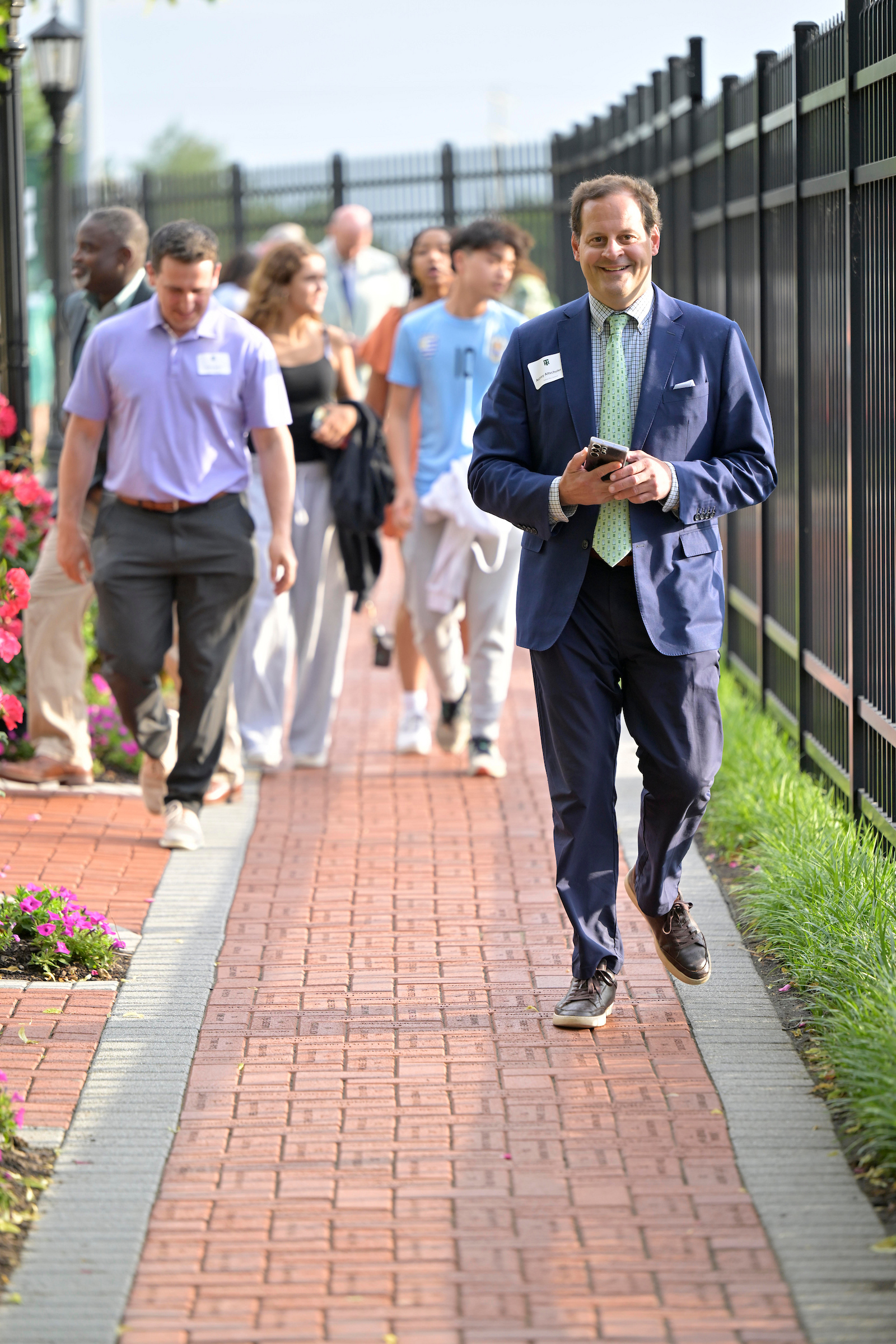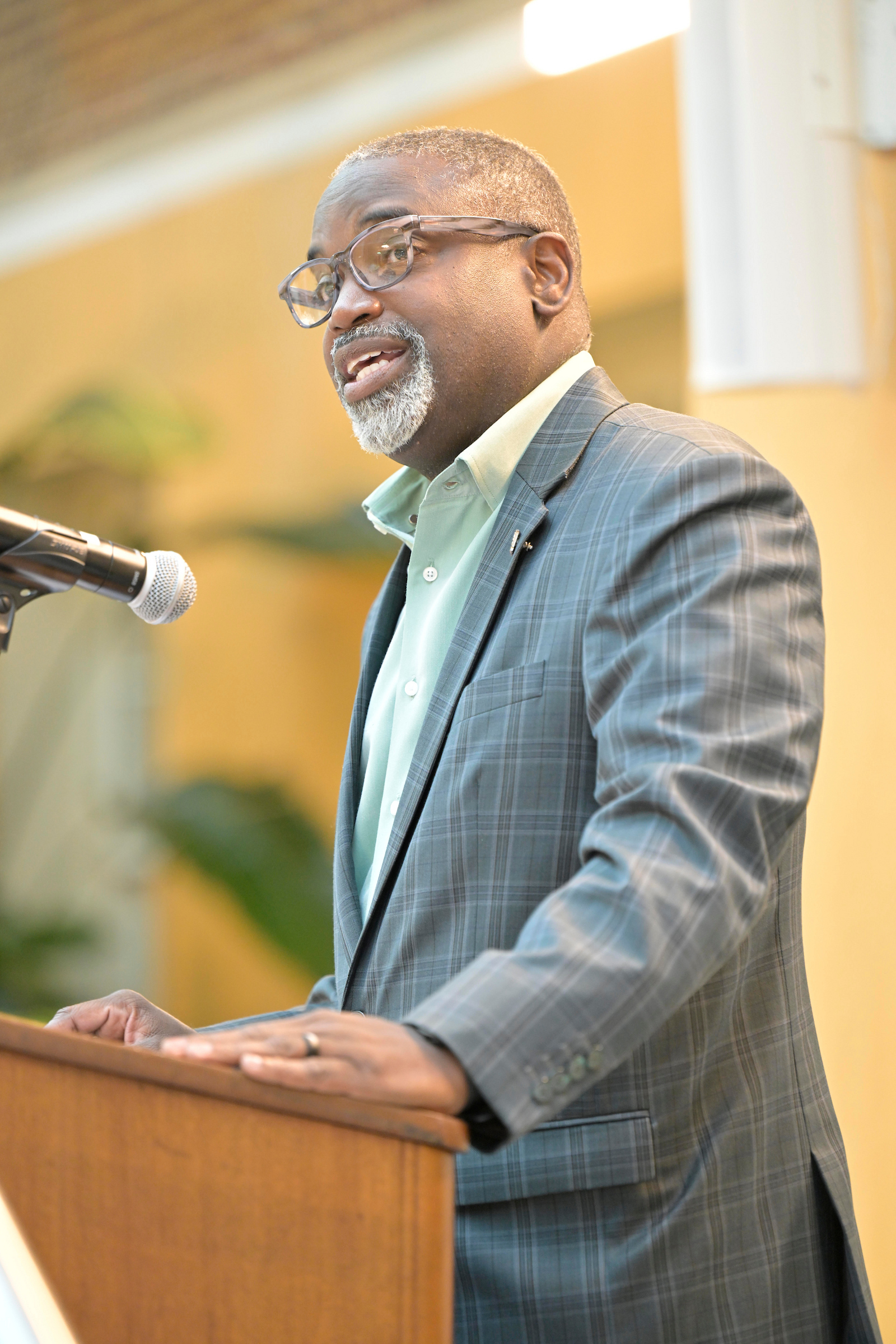
Matthew Twyman, III '88 shares advice at Alumni Council Senior Dinner
At the Alumni Council Senior Dinner on May 29, keynote speaker Matt Twyman ’88 addressed the Class of 2025.
Thank you to the class of 2025 for the opportunity to speak with you this evening. Many of you know me as Mr. Twyman, Coach Twyman, or the dad of Xavier Twyman, class of ’28, and your classmates Bryce and Colby Twyman ’25. But as you heard from my bio, I, too, am a proud Tower Hill graduate, class of ’88.
As I prepared for this speech, I struggled with what to share with the class of 2025 — a class that is graduating 37 years after my own! What interesting stories can I share, with which you will relate? What pearls of wisdom will interest you? Sure, my bio on paper may make me sound like a very interesting guy —well put together, with an intriguing professional career. But when I started at Tower Hill, I was a far cry from what you just heard. I was a skinny child who would grow into an even skinnier child in need of braces.
Today, I am just a man from Wilmington, Delaware, who, after some time away, has returned home to his alma mater and has the honor of helping the next generation prepare for the race ahead. I’m not a skinny child anymore. But there is one thing that I started to acquire during my time at Tower Hill and still own today, and in which I invest and build upon regularly: my personal brand. When I really think about it, owning and protecting my personal brand has made a profound difference in pursuing my dreams, finding success and contributing to the world. So, I thought I could share some thoughts and ideas that will be helpful to you as you continue to build and invest in your own personal brand after graduating from Tower Hill.
WHAT IS A PERSONAL BRAND?
A personal brand is not just what one has done or achieved but what one represents, who they are and how others perceive them. The strongest brands are built on the actions and choices taken (or not taken) even when no one is watching. Every day, we have opportunities to strengthen or weaken our brand through our words, actions and choices. So, it’s important to think deeply about your brand and what you want it to stand for. Guard your brand thoughtfully. Invest in it consistently. You may be thinking the degree you’re going to pursue and the home you’ll one day buy are important assets—and they are—but the reality is, your personal brand is the most valuable asset you own.
In my opinion, there are three core rules you need to follow to strengthen, protect and own your brand. For some of you in this room—namely, my indoor and outdoor track and field athletes whom I’ve coached, as well as my children—these three rules are going to sound pretty familiar, because they also apply on the track oval. But trust me, these are core credos that also apply off the track and will help ensure you own a strong, personal brand.
But, before we dive into the three rules, let me first give you some context on how my brand was formed.
My early experiences influenced and shaped aspects of my personal brand—as the quiet observer, I became the perceptive leader who could read a room; as the youngest sibling who had to earn his place, I became someone who valued inclusion and making space for all voices; as the skinny football player who faced much larger opponents, I became known for determination, regardless of the odds.
The truth is, each of us has lessons learned, perspectives gained and wisdom earned based on our unique personal stories and experiences, which is why your personal brand will be unique to you. But in my opinion, the following three rules are universal keys to strengthening and protecting your personal brand.
RULE #1: POSITIVE ATTITUDE
You can’t choose the situation you’re born into, and most times you can’t choose the circumstances you’ll have to navigate, but you can choose your attitude and how you react. I couldn’t help that, as a senior in high school, I was about 135 pounds soaking wet (with two five-pound weights in my pockets) playing varsity football for Tower Hill. But I could choose my attitude and approach.
I learned this the hard way, many years ago on a cold fall evening playing football at Tower Hill. It had been a long day. I was cold and tired, and worried about quizzes and a test. I wasn’t in a positive mindset. Coach Hyde was speaking directly to me and going on and on about the intricacies of a particular play—the blocking scheme, my duties, body position, how aggressive I needed to be, all the things I needed to do to be successful given my very slight stature. I gave a lot of head nods to say I understood, and soon enough, it was time to run the play and put all that information into practice.
Let me just say, the play was doomed from the start. Despite all the coaching and instructions I had received I completely missed my assignment. Damon Betz, our starting defensive tackle (who would go on to be a future All American at the University of Kentucky), proceeded to rush unblocked and unobstructed to our quarterback and pile drive into the ground. Coach Hyde calmly picked up the clipboard that he’d slammed on the ground, walked over to me, looked me in the eyes, and in a very calm, low voice said, “Mattie, if you don’t do your job, someone gets hurt.”
That was all it took for me to realize that a negative attitude had distracted me from doing my job. What Coach Hyde was asking of me wasn’t about me; others were depending on me.
Will you be positive or negative? Will you have a can-do approach or a defeatist attitude? That is completely up to you. Like I tell our athletes before particularly hard workouts, the workout is going to happen, whether you complain about the difficulty or not. My suggestion to them is what I am suggesting to you now: Take the negative energy and redirect it into positive energy so that you can apply it to the job at hand.
Choosing to have a positive attitude allows you to recognize when people are depending on you. I’m not saying there won’t be days when you don’t want to study or are feeling “blah.” There will be days when you’re exhausted and can’t get tasks completed. And yes, there will be days when you just don’t want to do what needs to be done. But the choice you make will be easier if your attitude acknowledges, “This is not about me; this is about the people who are depending on me.”
RULE #2: MAXIMUM EFFORT
Growing up in my family, it was hard not to observe maximum effort, no matter the task, from those who surrounded me, namely my parents and three older sisters.
I cannot remember a time when my dad was not working at least two jobs. He started as a janitor at DuPont and worked his way up to a lab technician. His “side hustle” to earn additional income and help offset the costs of raising a family of six was a very small janitorial service that he owned and operated, cleaning office buildings. Some of the offices he cleaned belonged to my classmates’ parents. Oftentimes, over the breaks and during the summer months, I would help my dad clean these same offices, seeing the family photos of my classmates. It was a humbling experience. For her part, mom would often pick up a second job just before school started or around the holidays to supplement household income and make sure we had what we needed. As a result, I learned the difference between a want and a need at a very young age.
More importantly, I learned what maximum effort means firsthand through my parents’ dedication to working multiple jobs to make things work financially for our family, enabling me and my sister to graduate from Tower Hill and all four of their children to go to college. After observing my parents exert maximum effort, how could I not work hard? I learned that I needed to do my part and put in maximum effort, whatever my goals were. It’s the least I could do!
What I learned in the process, however, is that putting in maximum effort is the magic ingredient that enhances, improves and highlights your talents and strengths. Yes, there were people who were far more talented than I, and who had far more advantages than I. But, putting in maximum effort helped separate me from others and was a key to my growth and success, and my brand throughout my career and life. Putting in maximum effort can sometimes help level the playing field when you have a disadvantage, and will definitely prepare you to be ready to take advantage of opportunities when they arise.
As my dad (a man of few words) said to me once, “Hard work is nothing more than attitude and approach.” My version of this, and as I tell the athletes I have the privilege of coaching, “What you put in is what you get out.”
Put in your maximum effort to achieve your goals. Sometimes that might mean getting comfortable being uncomfortable. We live in a competitive environment, and to achieve success, you have to be willing to do what others are not willing to do to achieve your goals.
As a senior manager at a Fortune 500 company, I was willing to move to “exotic” locations like Cleveland, Ohio, or Newark, New Jersey, to seize an opportunity. Toward the later stages of my corporate career, I worked on Wall Street. I pushed myself to compete with the best. You can and should as well.
Earlier in my career at MBNA, where I began my corporate journey, there were quotes written on the wall. Quotes like “Think of yourself as a customer” and “Complacency is devastating.” One of my favorites by Peter Drucker, a renowned management consultant and author, is “Things that get measured get attended to, and things that get attended to get done.” In other words, it’s a good idea to gauge your effort and progress by measuring yourself against the competition—doing so helps you identify how and what to focus on. As many of you I’ve coached have heard me say, competition doesn’t begin on the day of the track meet. It begins months and weeks before the competition. It begins with your preparation.
FINALLY, RULE #3: INTEGRITY
This one is critical and requires confidence. Integrity is something far more encompassing than just honesty. Integrity, at its core, is the invisible connective tissue that brings together authenticity and trust through your interactions and decisions. Integrity provides stability to your personal brand. It will allow your brand to weather challenges and grow stronger over time. It’s what transforms a personal brand from mere self-promotion into genuine influence—when people know they can count on your word, rely on your consistency, and trust your motives. Integrity means your private values align with your public persona, creating an alignment that people instinctively recognize and respect.
I like to think of integrity as the promise you make to the world about who you are. What values do you consistently demonstrate? What do you want people to think about when they think of you? Each time you follow through on a commitment, each time you speak the truth even when it’s difficult, each time you put in that extra effort when no one would notice if you didn’t—these moments aren’t just random acts of character; they’re investments in your brand.
Let me be clear: no one should care more about your integrity than you do. Your reputation will often arrive before you do, telling others what to expect from their interactions with you. One of the greatest competitive advantages you can have in any field is being known for unwavering integrity—being the person others can count on absolutely.
CONCLUSION
Seniors, right now everything is about you—prom, baccalaureate, this dinner, graduation, to name a few. And yes, you should celebrate all your successes and accomplishments. You’re doing it! Heck, you did it!
But I also want you to recognize this moment of graduation and transitioning to college is actually not all about you. It’s also about the people who have supported you along your journey, those loved ones who live vicariously through you and celebrate all of your successes and feel the pain of your shortcomings. I guarantee you, if you can recognize and understand the village supporting you, then the hard decisions and challenges ahead will become easier to navigate.
Class of 2025, I will leave you with this: while no one event defines your brand, and the building of your brand never stops, the foundation of your brand—the positive attitude you display, the maximum effort you put in and the integrity with which you make decisions, especially during challenging times—that’s what gives your brand its staying power. I encourage you to think deeply about your brand and what you want it to stand for. Your personal brand is something you own completely—make it what you want it to be. You will have many years to build your brand. Build it with intention. It will evolve, but fight ferociously to protect its core values. It represents you in rooms you have yet to enter.
Congratulations to the class of 2025! I’m excited to see the rooms you all will enter in your futures!

(L) Ashley Altschuler ’90, President of the Alumni Council, walks with seniors on the pathway where they each have a brick with their names and graduation year.


























